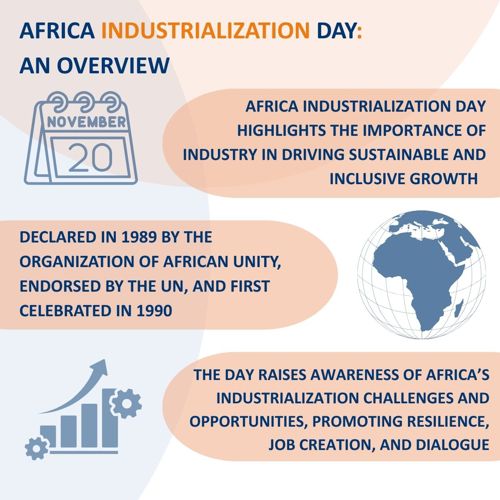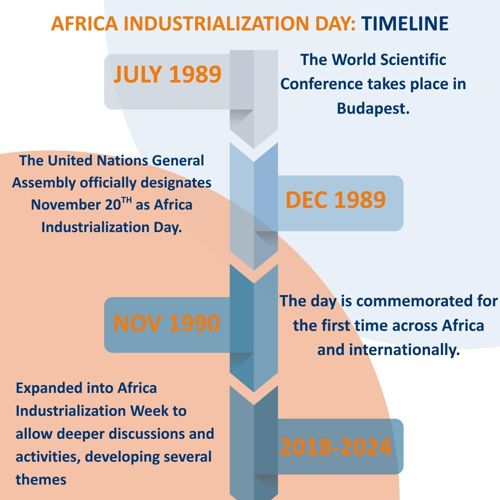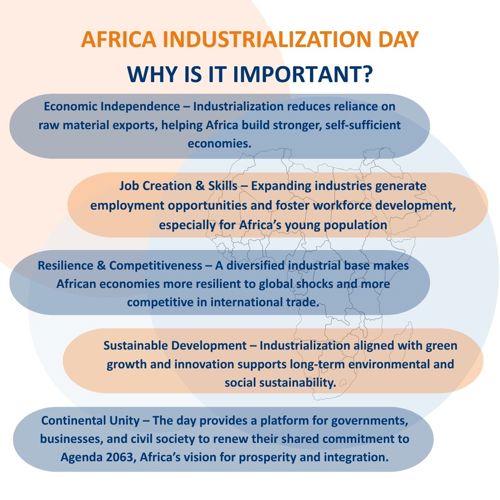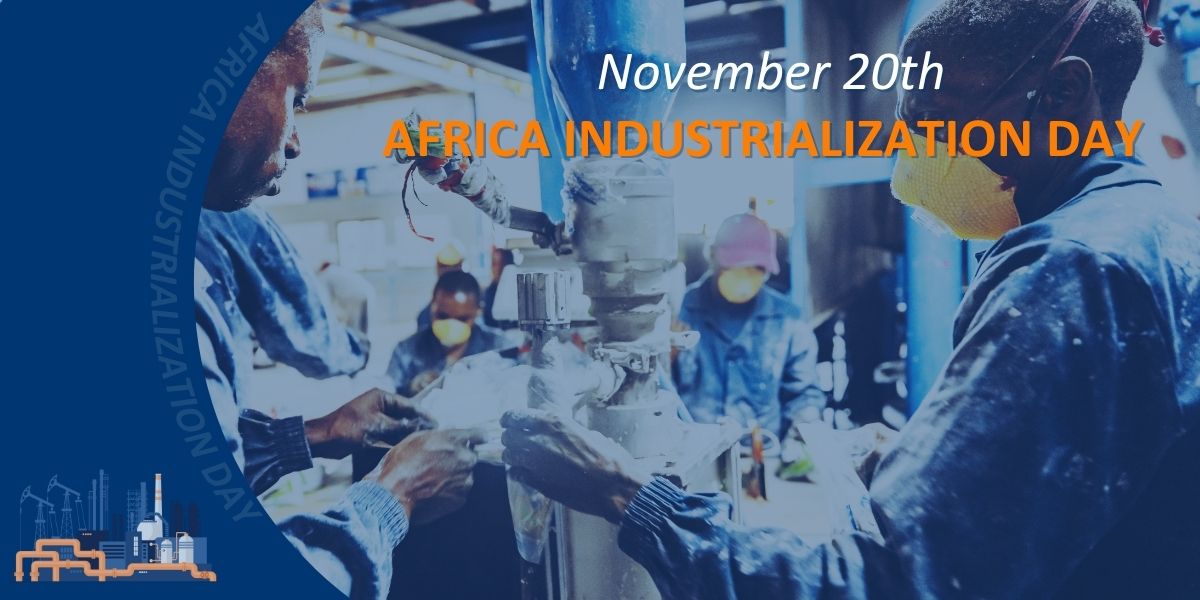November 20th, Africa Industrialization Day: A Call for Inclusive Growth
Every year on November 20th, Africa pauses to reflect on one of its most pressing challenges and greatest opportunities: industrialization. Known as Africa Industrialization Day, this occasion is more than a symbolic date on the calendar. It is a rallying point for governments, organizations, and international partners to consider how the continent can accelerate its industrial transformation and secure a more resilient, inclusive future.
The day was first proclaimed in 1989 by the Organization of African Unity in Addis Ababa, and later endorsed by the United Nations General Assembly. Since the first commemoration in 1990, it has become a platform for dialogue and collaboration, with events across Africa and at UNIDO headquarters in Vienna.
Symbols of unity and progress mark the celebrations: maps of Africa, including Madagascar, are displayed prominently, while flags of the African Union and national governments are hoisted to honor the shared vision of industrial growth. Leaders and institutions gather to discuss achievements and challenges, while international bodies such as the African Union, the Economic Commission for Africa, and the United Nations issue statements reinforcing the urgency of industrial development.
Why does industrialization matter so deeply for Africa? The answer lies in its transformative potential. It boosts productivity, creates jobs, strengthens economies, and reduces vulnerability to external shocks. It is about building resilient economies that can withstand global turbulence and foster inclusive prosperity. For Africa, where many nations remain heavily dependent on raw material exports, industrialization offers a pathway to value addition, innovation, and sustainable development.
Africa Industrialization Day is both a commemoration and a call to action. It reminds the world that Africa’s future depends on harnessing industry as a driver of prosperity and inclusion. By investing in industry today, the continent lays the foundation for a tomorrow defined by resilience, opportunity, and shared progress.
Since 2018, Africa Industrialization Day has evolved into Africa Industrialization Week, a series of events that deepen dialogue and action. In 2025, the Week will take place in Kampala, Uganda, from 17–21 November under the theme “Transforming Africa’s Economy through Sustainable Industrialization, Regional Integration and Innovation.” Alongside the main program, the African Women in Processing Forum (4th edition) and the African Youth Start‑ups Forum (1st edition) will provide platforms to empower women‑led enterprises and youth innovators, strengthen participation in value chains, and catalyze partnerships and investment opportunities across the continent.

HISTORY - TIMELINE

FIVE FACTS ABOUT AFRICA & INDUSTRIALIZATION DAY
1) A Vast and Diverse Continent: Africa is the world’s second-largest continent, home to about 3,000 ethnic groups and nearly 2,000 languages.
2) Landmarks of Global Importance: The Nile is the longest river in the world, the Sahara is the largest hot desert, and Morocco hosts the University of Karueein, the oldest continuously operating educational institution since 859 A.D.
3) Origins of Industrialization Day: Africa Industrialization Day was declared in 1989 by the Organization of African Unity and later endorsed by the United Nations, recognizing industrialization as vital for independence and resilience.
4) A Platform for Transformation: The day brings governments, businesses, and civil society together to renew their commitment to Agenda 2063, celebrating progress in manufacturing, agro‑processing, and ICT while addressing challenges.
5) From Day to Week: Since 2018, Africa Industrialization Day has expanded into Africa Industrialization Week, with annual themes ranging from regional value chains and AfCFTA opportunities to women’s empowerment and AI‑driven green growth.
WHY IS IT IMPORTANT?
Economic Independence – Industrialization reduces reliance on raw material exports, helping Africa build stronger, self-sufficient economies.
Job Creation & Skills – Expanding industries generate employment opportunities and foster workforce development, especially for Africa’s young population.
Resilience & Competitiveness – A diversified industrial base makes African economies more resilient to global shocks and more competitive in international trade.
Sustainable Development – Industrialization aligned with green growth and innovation supports long-term environmental and social sustainability.
Continental Unity – The day provides a platform for governments, businesses, and civil society to renew their shared commitment to Agenda 2063, Africa’s vision for prosperity and integration.

CONCLUSIONS
Africa Industrialization Day is a powerful reminder that industrialization is more than economic growth: it is a pathway to independence, resilience, and shared prosperity. On November 20th, we celebrate Africa’s progress while reaffirming our commitment to building industries that create jobs, strengthen trade, and drive sustainable transformation. By promoting inclusive and innovative industrialization, we can shape a future that is more competitive, equitable, and united, ensuring Africa becomes a dynamic force in the global arena.

